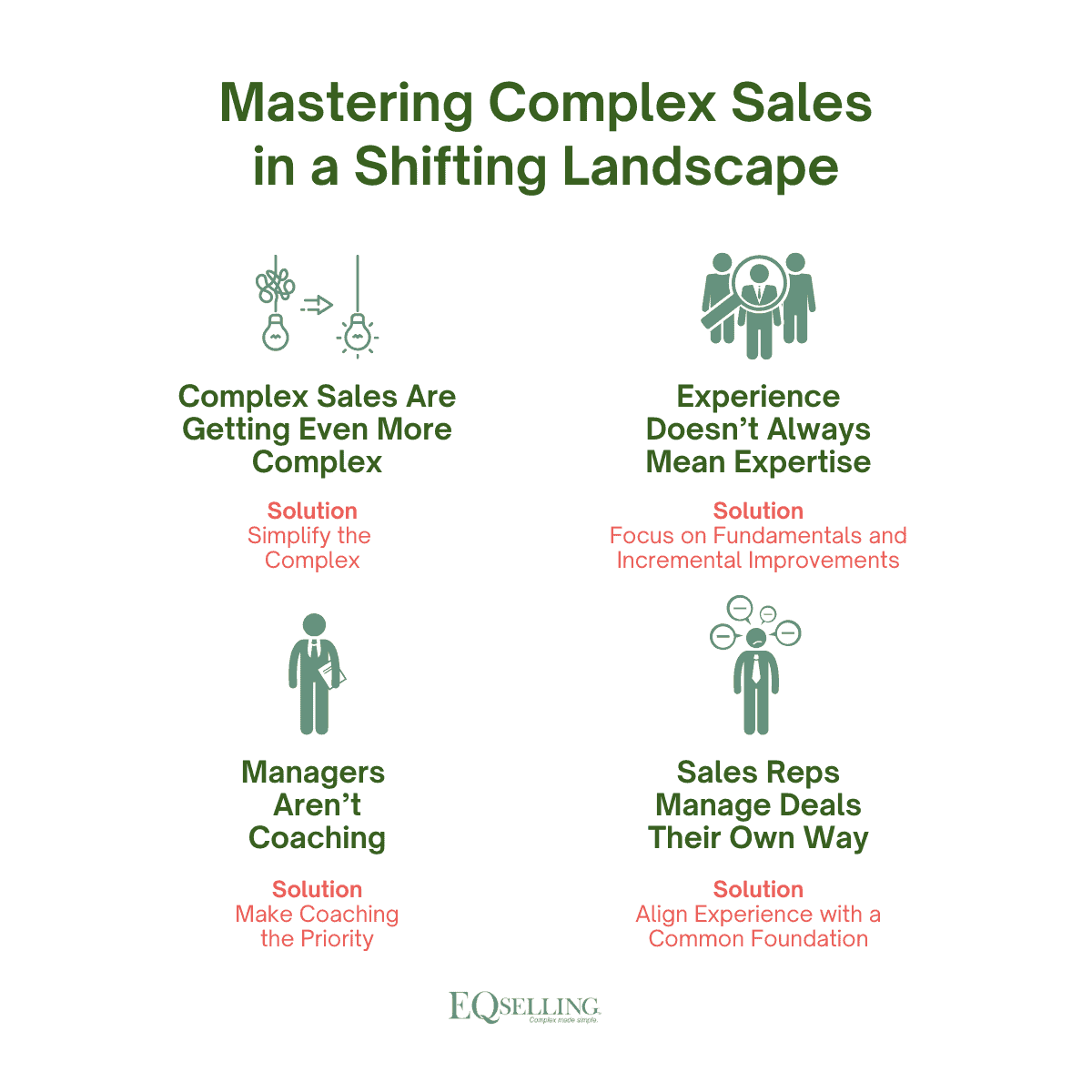4 Reasons Your Experienced Sales Team Isn’t Producing and How To Solve
You hire experienced sales reps with the expectation that years of industry know-how will automatically drive sales success. But despite their impressive resumes, your team’s performance might not be living up to expectations. Why? The answer lies in four key areas that can derail even the most seasoned salespeople.
In today’s rapidly evolving business landscape, even the most seasoned sales professionals find themselves navigating a complex maze of new challenges. From global economic uncertainties to the disruptive force of AI, the rules of the game are changing faster than ever before.
The Experience Paradox: When Seasoned Doesn’t Mean Successful
Here’s the kicker: experience doesn’t always equal expertise, especially in this new sales technology world..
In this eye-opening guide, we’ll go deep into the four critical reasons why your experienced sales team might be falling short of expectations. More importantly, we’ll equip you with actionable strategies to transform your team from seasoned veterans into agile, high-performing quota exceeders.
Let’s dive into why this happens and, more importantly, how you can address it.
Complex Sales Are Getting Even More Complex
The Challenge: No matter how much experience your team has, mastering complex sales is tougher than ever. Today’s sales environment is flooded with challenges beyond the rep’s control—economic uncertainty, revolutionary tech like AI, and shifting buying power from IT to business decision-makers. The result? Even the best reps are losing deals in a landscape full of new stakeholders, tighter budgets, and longer buying cycles.
The Solution: Simplify the Complex. Even in a complicated environment, the fundamentals of selling remain unchanged. Help your team refocus on what matters most—identifying the stakeholders that matter, building relationships with those stakeholders, crafting compelling value propositions, and creating solid business cases. By mastering the basics with precision, they’ll cut through the noise and close deals faster.
Action Step: Conduct a weekly strategy session where reps outline the top three stakeholders in their deals and their specific strategies to engage them. Use these sessions to refine messaging and create customized business cases that resonate with each stakeholder.
Managers Aren’t Coaching
The Challenge: With CRM tools providing deep visibility into every deal, frontline managers are drowning in data—cleaning, analyzing, and preparing reports. This leaves little time for what truly drives performance: coaching. Without proper guidance, experienced reps fall into bad habits, and new reps learn through inefficient trial and error.
The Solution: Make Coaching the Priority. Every conversation with a rep can be a coaching moment. Frontline managers already spend time reviewing deals and next steps with their reps—turn these moments into coaching opportunities. When managers focus on developing skills instead of simply reviewing data, reps improve, deals move faster, and forecasting becomes more accurate.
Action Step: Create a structured coaching framework where managers spend at least 30% of their time on one-on-one coaching sessions. Focus these sessions on deal strategy, skill development, and long-term career growth.
Experience Doesn’t Always Mean Expertise
The Challenge: Twenty years in sales doesn’t guarantee twenty years of success. Unfortunately, too many “experienced” reps come with gaps in critical skills—whether it’s researching accounts, building strategic relationships, or understanding customer challenges. In many cases, they mask poor performance by blaming external factors or relying on past glories.
The Solution: Focus on Fundamentals and Incremental Improvements. Don’t rely on what your reps tell you; validate their skills. Anchor your team in the fundamentals: identifying key stakeholders, understanding relevant technical and operational challenges, and building value propositions that align with customer goals. Then, drive incremental improvements on every deal. A relentless focus on getting just a few more things right each time will lead to better outcomes, faster closes, and larger deals.
Action Step: Implement skill validation sessions every quarter where reps demonstrate how they identify stakeholder challenges and create tailored value propositions. Use role-playing scenarios to identify gaps and refine their approach.
Sales Reps Manage Deals Their Own Way
The Challenge: Experienced sales reps are often overly confident, which can lead them to disregard your sales process in favor of “what’s always worked for them.” While creativity is valuable, reps who operate outside of standardized processes create inconsistencies in the customer experience, disrupt internal operations, and fail to capitalize on proven company-wide strategies.
The Solution: Align Experience with a Common Foundation. Just like doctors use a standardized diagnostic language, your sales team needs a common foundation. Establish clear definitions, criteria, and processes that every rep follows, regardless of experience. This alignment allows for the nuances of individual style but ensures that every deal is managed consistently and predictably. The result? Smoother sales operations, better customer experiences, and improved revenue forecasting.
Action Step: Develop a playbook that outlines your company’s sales processes, complete with templates, checklists, and real-world examples. Make adherence to this playbook a core part of performance evaluations.
From Good to Great: Turning Experience into Extraordinary Results
Experienced sales teams face challenges, but those challenges don’t have to hold them back. The complexity of today’s sales environment calls for a return to the basics: building strong connections, creating value-driven solutions, and navigating decision-makers with clarity. Experience isn’t enough on its own—what matters is honing the right skills and making steady improvements to keep your team agile and effective.
Managers play a pivotal role here. Shifting from merely analyzing data to actively coaching their reps empowers teams to confidently tackle modern sales challenges. When individual talents are channeled through a shared, standardized process, it creates smoother operations, a better customer experience, and more consistent results.
Focusing on these strategies can help your team break through barriers and reach their full potential, transforming seasoned sales professionals into unstoppable, high-performing contributors.
Master the Fundamentals, Drive Consistency, and Watch Sales Soar
Addressing these four common pitfalls helps your experienced sales team realize its true potential, leading to better performance, higher win rates, and more consistent results.
The key is refocusing on the fundamentals, emphasizing incremental improvements, and ensuring managers actively coach. When your team operates within a disciplined, well-defined framework, success will follow.
To help you implement these principles, download our free guide, Accelerate Revenue Growth: The Essential Guide for Sales Team Success. This resource provides proven strategies to build a high-performing sales culture that consistently delivers results.
Accelerate Revenue Growth: The Essential Guide for Sales Team Success
Build a Winning Sales Culture That Consistently Delivers Results



